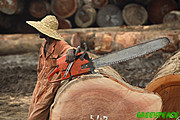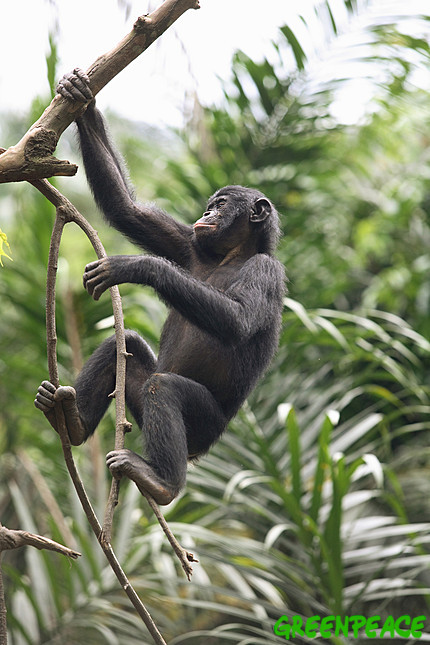
The Congo Government introduced a moratorium in 2002 forbidding the allocation, extension and renewal of logging titles. But despite the original moratorium being reaffirmed by Presidential decree, it has been widely ignored.
We are demanding that the Democratic Republic of the Congo (DRC), the World Bank, and other stakeholders take urgent action to stop the expansion of the logging industry in Congo's rainforests, and to fund alternatives to deforestation.
The Congo Rainforest is a critical habitat for the endangered bonobo (a relative of the chimpanzee) and other threatened species such as the forest elephant and the hippopotamus. It is considered to be a priority region for conservation, and is also home to numerous communities of the Twa and Bantu ethnic groups.

A bonobo swings on a tree in a bonobo sanctuary. Bonobos were the last of the great apes to be discovered. They live exclusively in the Democratic Republic of Congo. They are considered to be man's closest relative and organise themselves in sophisticated social groups. They are highly endangered from hunting and loss of habitat.
Delegates from the Congolese Government, donor community and civil society will meet next week in Brussels to discuss the sustainable management of the forests of the DRC. Greenpeace is demanding that all forest titles allocated by the government -- in breach of its own moratorium -- are cancelled. This would include ITB's. We want an ongoing legal review of all logging titles and an extension of the moratorium until comprehensive land-use planning and sufficient governance capacity is in place in the DRC forest sector.
"Logging companies promise us wonders: work, schools, hospitals, but actually, they seem to be only interested in their own short term profits. What will happen when our forests have been emptied? They will leave and we'll be the ones left with damaged roads, schools with no roofs and hospitals without medicine," said Pasteur Matthieu Yela Bonketo, coordinator of CEDEN, a Congolese NGO active in Equateur province who will be in Brussels for next week's conference. "Industrial logging doesn't bring benefits. The Twa and Bantu people who totally depend on our forests and the local communities who live in them are suffering because of the presence of the industry," he concluded.
Related articles
- • Jean-Pierre Bemba named MLC presidential candidate (July 13, 2018)
- • DR Congo: The country that knows how to beat Ebola (December 11, 2014)
- • Ebola Epidemic Resurfaces in DR Congo's Equateur Province (August 25, 2014)
- • Claims that threat to Congo Basin forest is waning are misleading (July 22, 2013)
- • Deforestation Slows in Congo Basin (July 22, 2013)
- • Widespread abuse of logging permits opens up Congo's forests to more destruction (October 25, 2012)
- • DR Congo, IMF to Co-Host Conference on the Management of Natural Resources (March 13, 2012)
- • African Rainforests Continue to Face Challenges (January 6, 2012)
- • Tshisekedi Says He Won, Can He Prove It? (December 17, 2011)
- • Kabila Leads Partial Election Results (December 3, 2011)
- • Candidates to Make Last Stand in Kinshasa before Monday's Election (November 26, 2011)
- • UN advises prudent use of abundant resources to spur development (October 10, 2011)
- • 19,497 Candidates to Run for 500 Seats in Parliament (September 26, 2011)
- • At least 50 Dead after Two Boats Collide on Ruki River (July 29, 2011)
- • Global Witness welcomes DR Congo's decision to publish resource contracts (June 3, 2011)
- • Kabila, Sassou meet in Kinshasa over security (April 16, 2011)
- • Upcoming UN-backed summit to focus on sustainable management of rainforests (April 13, 2011)
- • DR Congo Recalls Ambassador to Brazzaville (March 26, 2011)
- • Government Launches Investigation into Latest Boat Accidents (September 6, 2010)
- • Key excerpts from UN report on Rwandan army genocide in DR Congo (August 27, 2010)
- • Equateur Province Governor Bans Exports of Unprocessed Timber (July 7, 2010)
- • Leader of Enyele Rebels Arrested in Equateur (May 5, 2010)
- • DR Congo army regains control of Mbandaka (April 4, 2010)
- • Enyele rebels enter major city in Equateur province (April 4, 2010)
- • UNEP, PUMA in joint strategic deal to support biodiversity worldwide (January 7, 2010)
- • Blue helmets protect thousands daily, says top UN envoy (December 28, 2009)
- • DR Congo armed forces enter troubled Dongo area (December 15, 2009)
- • Ban Ki-moon deplores attack on UN helicopter in DR Congo (November 27, 2009)
- • DR Congo to host CEEAC summit on peace, integration, environment (October 23, 2009)
- • Jean-Pierre Bemba Allowed to Attend Mass for His Father in Brussels (July 7, 2009)
Tags: |







